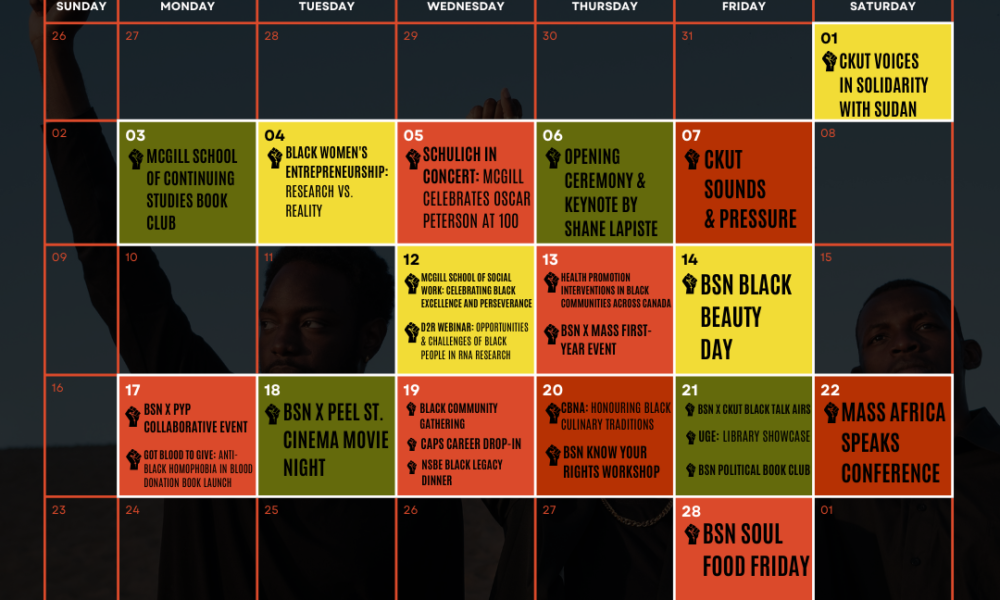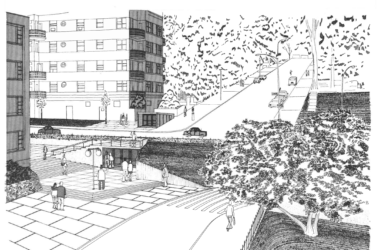The Black Students’ Network (BSN), a McGill club dedicated to addressing the interests and needs of Black McGill students, has a variety of activities planned in honour of this year’s Black History Month.
BSN’s first week of Black History Month will focus on education and community building, with events such as Black Women’s Entrepreneurship: Research vs. Reality on Feb. 4. On Thursday, Feb. 6, BSN will host the BSN x McGill African Students’ Society (MASS) First-Year Event, which marks the first collaborative event between two Black student clubs this month. The first week wraps up on Friday, Feb. 7 with CKUT Sounds & Pressure: Reggae in a Foreign Land, a night dedicated to the Caribbean diaspora and culture in Canada with film, music, food, and community.
The second week of BSN’s Black History Month agenda aims to highlight Black excellence, health, and self-love, beginning on Wednesday, Feb. 12 with a talk from the McGill School of Social Work titled Celebrating Black Excellence and Perseverance. The following day will dive into “Health Promotion Interventions in Black Communities Across Canada.” On Valentine’s Day, BSN’s Black Beauty Day will celebrate Black beauty and self-care, featuring a free hair braiding raffle with sign-ups currently open.
Week three features community, culture, and advocacy with a special Black History Month screening at the Peel Street Cinema Movie Night on Tuesday, Feb. 18. The next day, a Black Community Gathering, Caps Career Drop-In, and the NSBE Black Legacy Dinner honouring Black achievement will take place. On Thursday, Feb. 20, BSN will host a “Know Your Rights” Workshop, equipping students with crucial legal knowledge on their rights. The week concludes on Saturday, Feb. 22, with the MASS Africa Speaks Conference.
Finally, the BSN will wrap up the month with their Feb. 28 event, “BSN Soul Food Friday.”
The BSN’s Vice-President Social Events, Reggiany Bourguillon, U2 Arts, spoke with The Tribune about this year’s BSN’s Black History Month.
“I recognize BSN’s values as hosting multi-diversity among the Black McGill community, Black empowerment, and the cultivation of Black young minds,” Bourguillon said.
One of her favourite BSN events is “Youth Day”, which promotes initiatives for Black high school and college students to apply to McGill. The event thus contributes to increasing the diversity in the university—where only 4.4 per cent of the student body self-identify as Black.
“BSN makes sure to include students of any background whether it is cultural, educational, personal, or sexual. They want all Black students to feel seen and understood,” Bourguillon said.
Despite BSN’s efforts, Bourguillon remarks that there is an evident lack of recognition and sincere support of the McGill Black students community on campus.
“[There should be] more funding regarding scholarship for Black students in different educational fields, as well as more recognition from the university to put to the forefront the different accomplishments of BSN and other black clubs into the university main site to demonstrate the club’s efforts,” Bourguillon said.
Indeed, the responsibility to foster a truly equitable environment on campus cannot rest solely on BSN and other Black student-led clubs. McGill has the duty to actively support Black students’ academic journeys and push for lasting changes. This includes increasing funding for Black student enrollment and the creation of Black studies programs, greater institutional support of Black faculty and experiences of Black students, and stronger collaborations with Black organizations. Active participation helps uplift the voices of Black students and pushes for necessary institutional changes that promote diversity, equity, and representation at McGill. To learn more about the BSN club and its events, visit their Instagram page.









